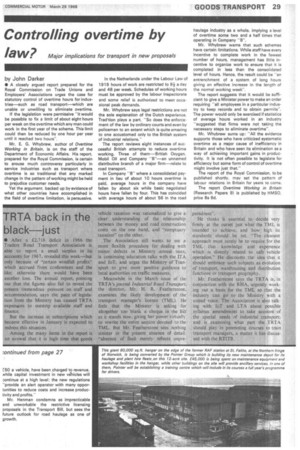Controlling overtime by
Page 31

If you've noticed an error in this article please click here to report it so we can fix it.
law? Major implications for transport in new proposals by John Darker
• A closely argued report prepared for the Royal Commission on Trade Unions and Employers' Associations urges the case for statutory control of overtime hours for industries—such as road transport—which are unable or unwilling to eliminate overtime.
If the legislation were permissive "it would be possible to fix a limit of about eight hours per week on the overtime which any man could work in the first year of the scheme. This limit could then be reduced by one hour per year until it reached two hours".
Mr. E. G. Whybrew, author of Overtime Working in Britain, is on the staff of the Department of Economic Affairs. His report prepared for the Royal Commission, is certain to arouse much controversy particularly in service industries such as transport where overtime is so traditional that any marked change in the pattern of working might be held to prejudice customer needs.
Yet the argument, backed up by evidence of what other countries have accomplished in the field of overtime limitation, is persuasive.
in the Netherlands under the Labour Law of 1919 hours of work are restricted to 81 a day and 48 per week. Schedules of working hours must be approved by the labour inspectorate and some relief is authorized to meet occasional peak demands.
Mr. Whybrew says legal restrictions are not the sole explanation of the Dutch experience. Tradition plays a part. "So does the enforcement of the law by ordinary courts and even by policemen to an extent which is quite amazing to one accustomed only to the British system of industrial relations."
The report reviews eight instances of successful British attempts to reduce overtime working. Three of them—British Oxygen, Mobil Oil and Company "B"—an unnamed distributive branch of a major firm—relate to road transport.
In Company "B" where a consolidated payment in lieu of about 10 hours overtime is paid, average hours in the company have fallen by about six while basic negotiated hours have fallen by four. This has coincided with average hours of about '56 in the road haulage industry as a whole, implying a level of overtime some two and a half times that operating in Company "8".
Mr. Whybrew warns that such schemes have certain limitations. While staff have every incentive to complete work in the fewest number of hours, management has little incentive to organize work to ensure that it is completed in less than the consolidated level of hours. Hence, the result could be "an entrenchment of a system of long hours giving an effective increase in the length of the normal working week".
The report suggests that it would be sufficient to give a Minister power to make an order requiring "all employees in a particular industry to keep records and to obtain permits". The power would only be exercised if statistics of average hours worked in an industry "suggested that firms were not taking the necessary steps to eliminate overtime".
Mr. Whybrew sums up: "All the evidence supports those who have criticized systematic overtime as a major cause of inefficiency in Britain and who have seen its elimination as a way of achieving important gains in productivity. It is not often possible to legislate for efficiency but some form of control of overtime might involve just that."
The report of the Royal Commission, to be published shortly, may set the pattern of labour relations in Britain for years to come.
The report Overtime Working in 5' ritain (Research Papers 9) is published by HMSO, price 8s 6d.
























































































































